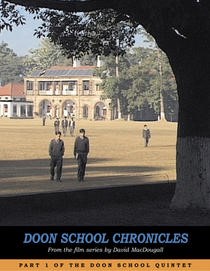
Ethnography is a branch of anthropology and the systematic study of individual cultures. Ethnography explores cultural phenomena from the point of view of the subject of the study. Ethnography is also a type of social research that involves examining the behavior of the participants in a given social situation and understanding the group members' own interpretation of such behavior.

Visual anthropology is a subfield of social anthropology that is concerned, in part, with the study and production of ethnographic photography, film and, since the mid-1990s, new media. More recently it has been used by historians of science and visual culture. Although sometimes wrongly conflated with ethnographic film, visual anthropology encompasses much more, including the anthropological study of all visual representations such as dance and other kinds of performance, museums and archiving, all visual arts, and the production and reception of mass media. Histories and analyses of representations from many cultures are part of visual anthropology: research topics include sandpaintings, tattoos, sculptures and reliefs, cave paintings, scrimshaw, jewelry, hieroglyphics, paintings and photographs. Also within the province of the subfield are studies of human vision, properties of media, the relationship of visual form and function, and applied, collaborative uses of visual representations.
Digital anthropology is the anthropological study of the relationship between humans and digital-era technology. The field is new, and thus has a variety of names with a variety of emphases. These include techno-anthropology, digital ethnography, cyberanthropology, and virtual anthropology.
Online ethnography is an online research method that adapts ethnographic methods to the study of the communities and cultures created through computer-mediated social interaction. As modifications of the term ethnography, cyber-ethnography, online ethnography and virtual ethnography designate particular variations regarding the conduct of online fieldwork that adapts ethnographic methodology. There is no canonical approach to cyber-ethnography that prescribes how ethnography is adapted to the online setting. Instead individual researchers are left to specify their own adaptations. Netnography is another form of online ethnography or cyber-ethnography with more specific sets of guidelines and rules, and a common multidisciplinary base of literature and scholars. This article is not about a particular neologism, but the general application of ethnographic methods to online fieldwork as practiced by anthropologists, sociologists, and other scholars.

Anthropology of media is an area of study within social or cultural anthropology that emphasizes ethnographic studies as a means of understanding producers, audiences, and other cultural and social aspects of mass media.

Video ethnography is the video recording of the stream of activity of subjects in their natural setting, in order to experience, interpret, and represent culture and society. Ethnographic video, in contrast to ethnographic film, cannot be used independently of other ethnographic methods, but rather as part of the process of creation and representation of societal, cultural, and individual knowledge. It is commonly used in the fields of visual anthropology, visual sociology, visual ethnography and cultural studies. Uses of video in ethnography include the recording of certain processes and activities, visual note-taking, and ethnographic diary-keeping.
Juan Francisco Salazar is a Chilean anthropologist and filmmaker. He has lived in Sydney, Australia since 1998. He is professor of media studies at the School of Humanities and Communication Arts and Fellow of the Institute for Culture and Society (ICS). From 2020 he is an Australian Research Council Future Fellow.

An ethnographic film is a non-fiction film, often similar to a documentary film, historically shot by Western filmmakers and dealing with non-Western people, and sometimes associated with anthropology. Definitions of the term are not definitive. Some academics claim it is more documentary, less anthropology, while others think it rests somewhere between the fields of anthropology and documentary films.
Sarah Franklin is an American anthropologist who has substantially contributed to the fields of feminism, gender studies, cultural studies and the social study of reproductive and genetic technology. She has conducted fieldwork on IVF, cloning, embryology and stem cell research. Her work combines both ethnographic methods and kinship theory, with more recent approaches from science studies, gender studies and cultural studies. In 2001 she was appointed to a Personal Chair in the Anthropology of Science, the first of its kind in the UK, and a field she has helped to create. She became Professor of Social Studies of Biomedicine in the Department of Sociology at the London School of Economics in 2004. In 2011 she was elected to the Professorship of Sociology at the University of Cambridge.

Genevieve Bell is the Vice-Chancellor of the Australian National University and an Australian cultural anthropologist. She is best known for her work at the intersection of cultural practice research and technological development, and for being an industry pioneer of the user experience field. Bell was the inaugural director of the Autonomy, Agency and Assurance Innovation Institute (3Ai), which was co-founded by the Australian National University (ANU) and CSIRO’s Data61, and a Distinguished Professor of the ANU College of Engineering, Computing and Cybernetics. From 2021 to December 2023, she was the inaugural Director of the new ANU School of Cybernetics. She also holds the university's Florence Violet McKenzie Chair, and is the first SRI International Engelbart Distinguished Fellow. Bell is also a Senior Fellow and Vice President at Intel. She is widely published, and holds 13 patents.

Heather A. Horst is a social anthropologist and media studies academic and author who writes on material culture, mobility, and the mediation of social relations. In 2020 she became the Director of the Institute for Culture and Society at Western Sydney University where she is a Professor and is also a lead investigator in the ARC Centre of Excellence for Automated Decision-Making and Society. Prior to this she was a professor of Media and Communications at the University of Sydney from 2017 and Vice Chancellor's Senior Research Fellow in the School of Media and Communication at RMIT University in Melbourne, Australia from 2011. She has also been a Research Fellow in the MA program in digital anthropology at University College London.
Luc Maria Alfons Pauwels is a Belgian visual sociologist and communication scientist, Professor of Communication Studies at the University of Antwerp, Belgium, and director of its Visual and Digital Cultures Research Center (ViDi). He is known for his work on visual research methods.
John Marshall Grady is an American sociologist and emeritus professor of sociology at Wheaton College, known for his seminal work in the field of visual sociology.
Multimodal anthropology is an emerging subfield of social cultural anthropology that encompasses anthropological research and knowledge production across multiple traditional and new media platforms and practices including film, video, photography, theatre, design, podcast, mobile apps, interactive games, web-based social networking, immersive 360 video and augmented reality. As characterized in American Anthropologist, multimodal anthropology is an "anthropology that works across multiple media, but one that also engages in public anthropology and collaborative anthropology through a field of differentially linked media platforms". A multimodal approach also encourages anthropologists to reconsider the ways in which they conduct their research, to pay close attention to the role various media technologies and digital devices plays in the lives of their interlocutors, and how they these technologies redefine what fieldwork looks like.

Visual ethnography is an approach to ethnography that uses visual methods such as photography, film and video. There are many methods available to conduct visual ethnography. According to Sarah Pink, visual ethnography is a research methodology that brings “theory and practice of visual approaches to learning and knowing about the world and communicating these to others”. As a methodology, visual ethnography can guide the design of research as well as the methods to choose for data collection. Visual ethnography suggests a negotiation of the participants’ view of reality and a constant questioning on the part of the researcher.

David MacDougall is an American-Australian visual anthropologist, academic, and documentary filmmaker, who is known for his ethnographic film work in Africa, Australia, Europe and India. For much of his career he co-produced and co-directed films with his wife, fellow filmmaker Judith MacDougall. In 1972, his first film, To Live with Herds was awarded the Grand Prix "Venezia Genti" at the Venice Film Festival. He has lived in Australia since 1975, and is currently a professor in the Research School of Humanities & the Arts at Australian National University.

The Doon School Quintet is a five-part ethnographic film series made by the American visual anthropologist and documentary filmmaker David MacDougall, between 1997 and 2000, at The Doon School, an elite all-boys boarding school in India. For thirteen months over three years, MacDougall lived with the students and was given unprecedented access for filming inside the residential campus. By the end, MacDougall had more than 85 hours of material, which he edited into 5 parts, with a total duration of about 8 hours. The project ranks among MacDougall's most ambitious and longest works and is the only film series in his oeuvre.

Yarimar Bonilla is a Puerto Rican political anthropologist, author, columnist, and professor of anthropology and Puerto Rican studies at Hunter College and the Graduate Center of the City University of New York. As of 1 July 2023 she is a Professor at Princeton's Effron Center. Bonilla’s research questions the nature of sovereignty and relationships of citizenship and race across the Americas.

Marcus John Banks was an English visual anthropologist, who did fieldwork among the Jains in Leicester, England and Jamnagar, Gujarat, India. He was a prominent figure in the development of visual anthropology in the late 20th and early 21st Centuries.









